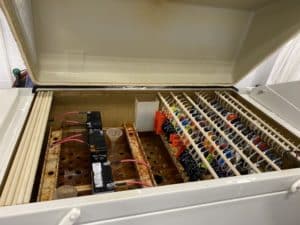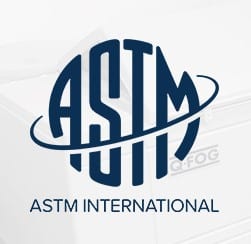Micom is accredited by A2LA to perform various ASTM tests as well as many other test methods.
Corrosion Testing Services

Micom Laboratories is a corrosion testing laboratory that offers numerous material degradation and corrosion testing services. Our material testing lab is accredited ISO/IEC 17025 by the A2LA for corrosion testing and is an approved supplier to Airbus, Bombardier Aerospace, De Havilland Canada, VikingAir, and many other organizations.
Often performed using ASTM B117 test, corrosion testing has a positive effect on the development, design and lifespan of numerous products. For industries such as aerospace, transportation, and medical devices, this type of testing is vital to ensure the proper development and durability of the product, as it will reduce the risk of corrosion.
How is Corrosion Testing Done in a Laboratory?
There are many types of corrosion tests depending on the variables and environment your material will be subjected to in real life. Our tests simulate real-world accelerated corrosion environmental conditions to provide accurate assessments of material performance. We can create customized test rigs for challenging environments, ensuring that your products are tested under conditions that closely mimic their actual operating scenarios. This approach enhances the reliability and relevance of our testing outcomes, giving you confidence in the durability and longevity of your materials and products.
Below are some of the specific types of corrosion testing techniques we perform in our material testing laboratory:
- Cabinet Tests
- Salt spray fog
- Humidity
- Cyclic
- Immersion corrosion
- Seawater
- Freshwater
One of the most popular standardized test methods is the ASTM B117 Salt Spray test, as it provides good repeatability without being too expensive. It is used to assess the corrosion resistance of coated or otherwise surface-treated samples. ASTM B117 is not a good time predictor in terms of accelerated aging/predictability as it provides static conditions. However, this is the first standardized test method used for corrosion testing; therefore, there is a lot of historical data against which current materials can be benchmarked.
Cyclic corrosion test methods are intended to be more realistic for assessing material corrosion resistance than traditional steady-state exposure tests. Since real-world atmospheric exposures typically include wet and dry conditions, laboratory cyclic corrosion tests can be used to reproduce these natural cyclic conditions in an accelerated manner. Even though Micom offers many cyclical tests, their use is still limited in many industries.
Accredited Corrosion Tests Offered at Micom
- Salt Spray Corrosion Testing: ASTM B117, ASTM D1654, ASTM D1735, ASTM D2247, ASTM D5894, ASTM G85, ISO 9227, MIL-STD-810H Test Method 509.6 and more.
- Cyclic Corrosion Testing: ASTM D1654, ASTM D610, ASTM D5894, ASTM G44, ASTM G85, ISO 11997, SAE J2334, and more.
- Humidity Exposure Testing: ASTM D1735, ASTM D2247, ASTM D4585, MIL-STD-810 Test Method 507.6 and more.
Details About The Most Common Corrosion Tests
ASTM B117
Neutral salt spray testing ASTM B117 (identical to ISO 9227) is arguably the best-known and still the most used corrosion test in the world. It was initially published in 1939 as an official standard. Numerous test methods, like MIL-STD, SAE or even ASTM methods, still refer to ASTM B117 for corrosion testing even if more specific and advanced test methods are now available. The main reason remains that so many companies worldwide have so much data on the behavior of their products and materials based on ASTM B117.
ASTM G85
ASTM G85 can be seen as an improved version of ASTM B117 to some extent. The standard uses the basic principles of ASTM B117 but adds the specificities of certain industry sectors in order to address their particularities.
ASTM D5894
ASTM D5894 integrates more natural factors than traditional corrosion tests like ASTM B117 or ASTM G85. By integrating the effects of UV, temperature, and humidity variations, ASTM D5894 improves the correlation with natural corrosion observed in the field.
Benefits of Performing Corrosion Testing with Micom
Comprehensive Testing Services
We offer a wide range of corrosion testing services, including salt spray testing, cyclic corrosion testing, and humidity testing. This allows us to address various corrosion-related concerns across different materials and industries.
Risk Mitigation
Corrosion testing helps identify potential risks and vulnerabilities in your materials and coatings. Understanding these risks allows you to take proactive measures to mitigate them, ensuring the durability, longevity, and safety of your products.
Customized Testing Solutions
We understand that different products and industries have unique requirements. Micom offers customized testing solutions tailored to meet the specific needs of your projects, ensuring relevant and actionable insights.
Accurate, Reliable & Timely Results
At Micom, we utilize advanced testing methodologies and state-of-the-art equipment to provide precise and reliable corrosion testing results. We prioritize efficiency, offering quick turnaround times to help you meet project deadlines without compromising on quality.
Expertise and Experience
Our team of experts has extensive experience and deep knowledge in corrosion science and testing. We provide expert guidance and support throughout the testing process, helping you understand the implications of the results and their impact on your products.
Micom is accredited by A2LA to perform various ASTM tests as well as many other test methods.

Micom is accredited by A2LA to perform various ASTM tests as well as many other test methods.
Understanding Corrosion
What is corrosion? Corrosion is the gradual destruction of materials (usually metals) by chemical reactions with their environment. It degrades the useful properties of materials and structures, including strength, appearance, and permeability to liquids and gases.
Worldwide, those damages cost up to 2.5 trillion US dollars which is equivalent to 3.4% of the global GDP in 2013. Every year, the United States alone loses 451 billion dollars on corrosion repairs which represents 11% of the country’s total budget and 2% of its GDP. In Canada, 5.2% of its country’s GDP is lost to corrosion every year. On the industrial level, rust found on metal, for example, can create health and safety concerns or lead to equipment failure and delays in production.
What Are the Different Types of Corrosion?
As highlighted by the non-exhaustive list shown below, many types of corrosion can occur on materials. These types of corrosion can damage various parts of a structure or material.
- Galvanic: Galvanic corrosion results in a powder-like white or grey deposit on the surface of the metal.
- Exfoliation: Exfoliation corrosion occurs due to flaking and loss of metal thickness.
- Pitting: Pitting corrosion is characterized by holes forming on the metal surface.
- Filiform: Filiform corrosion is identified by paint bulging and longitudinal patterns under the paint surface.
- Crevice: Crevice corrosion is a severe local corrosion that occurs along adjoining surfaces.
- Intergranular: Intergranular corrosion is normally only perceived by cracking within the metal structure.
- Fretting: Fretting corrosion involves the destruction of the natural protective film, resulting from slight relative movement between mating surfaces and subsequent oxidation.
- Stress: Stress corrosion is normally only perceived by cracking, with fast crack propagation leaving bare metal subject to further corrosion.
- Microbiological: Microbiologically influenced corrosion is characterized by local surface attacks or the formation of deposits such as fungi.
At Micom Laboratories, we can perform cyclic, static, and immersive corrosion tests. Furthermore, in some cases, we can activate your electronic products while exposed to a corrosive environment. Contact us for more information on our extensive corrosion testing services.
Ready To Ensure The Durability And Longevity Of Your Products?
Partner with Micom for comprehensive and reliable corrosion testing services. Our state-of-the-art laboratory and experienced team are equipped to simulate real-world environmental conditions, providing you with accurate and actionable insights. Whether you need salt spray testing, cyclic corrosion testing, or humidity exposure testing, we tailor our services to meet your specific needs and industry standards.
For additional test methods related to corrosion testing offered by Micom Laboratories, visit the following pages: ASTM B117, Coating Testing, Environmental Simulation Testing, and Accelerated Aging Testing.
Located in Montreal, Quebec, our corrosion testing lab serves a diverse range of industries, including automotive, aerospace, electronics, military, and transportation, in Canada and the USA. Don’t leave your product’s integrity to chance – trust Micom for all your corrosion testing needs. If you have any questions about these tests or our material testing services in general, we’ll be happy to answer them. Contact us today to ensure that your materials and products meet the highest durability and reliability standards.

